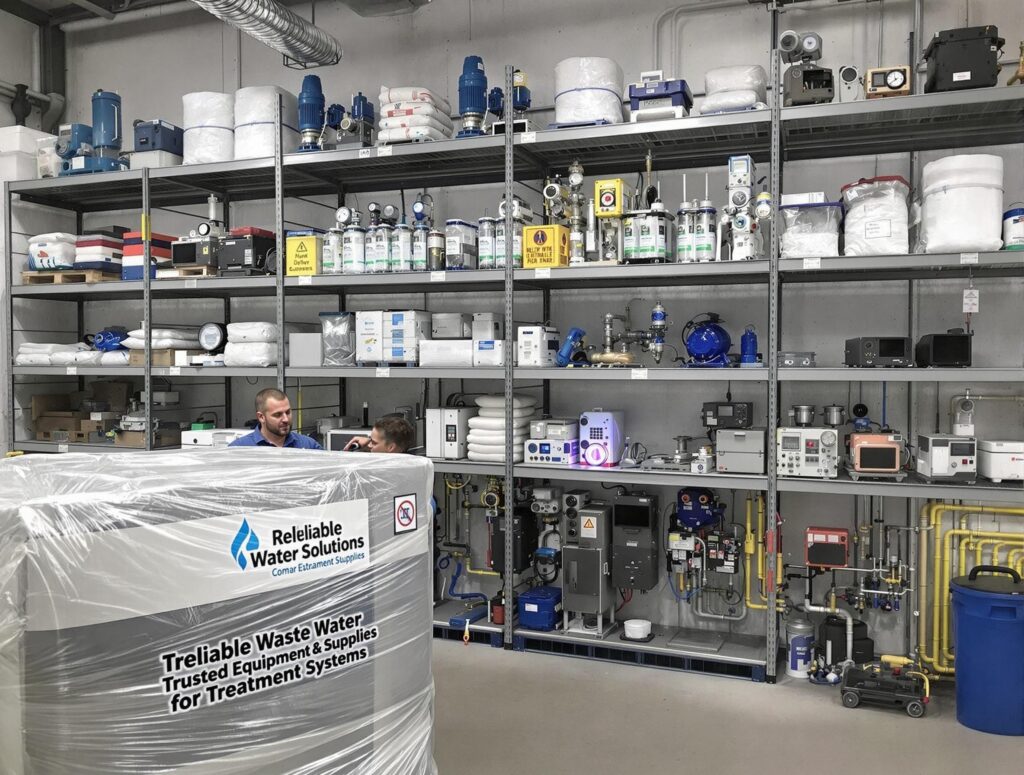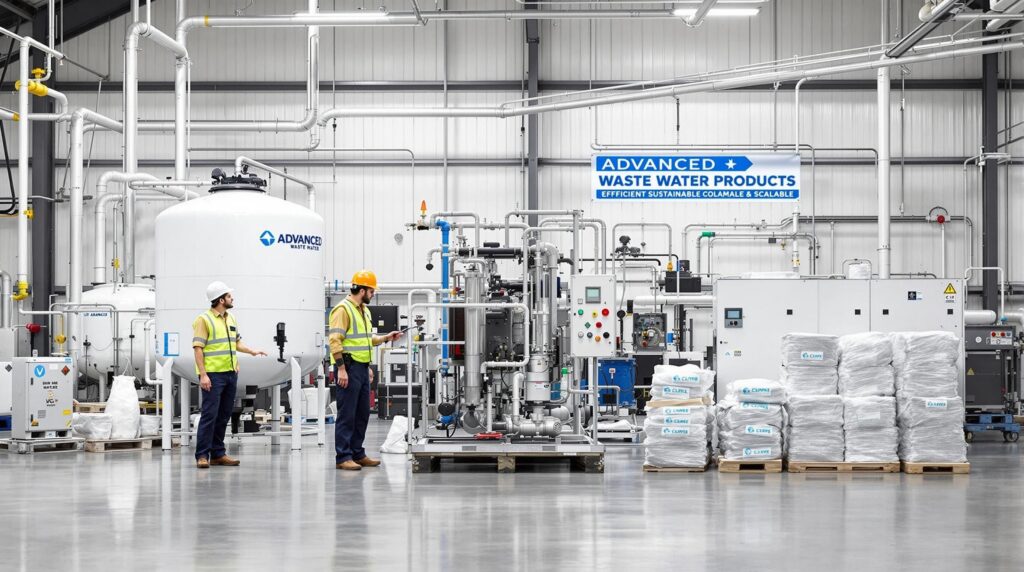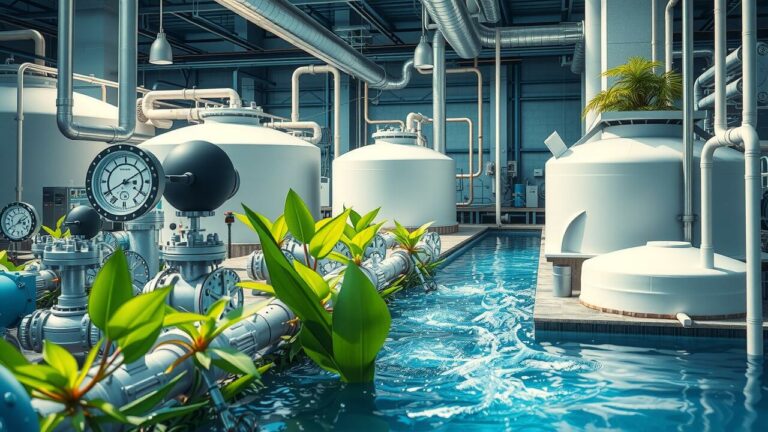Waste water systems play a crucial role in managing the quality of water and protecting public health and the environment. These systems encompass a variety of wastewater treatment systems designed to remove contaminants, enabling the safe reuse of treated wastewater and preserving natural water resources. Advanced wastewater treatment methods enhance the efficiency of wastewater management, ensuring that pollutants are adequately addressed before being released back into the environment. Each wastewater treatment facility is equipped to handle specific types of wastewater, making the selection of the appropriate wastewater treatment system vital for operational success. By integrating complete treatment and management solutions, communities can achieve sustainable practices that align with environmental goals while providing clean water for various uses.
Waste Water Systems | Complete Treatment & Management Solutions | Importance of Waste Water Systems
The significance of Waste Water Systems | Complete Treatment & Management Solutions cannot be overstated, as they play a crucial role in maintaining environmental integrity. Effective management of wastewater is essential not only for protecting water sources but also for promoting sustainable practices. The implementation of wastewater treatment plants facilitates industrial wastewater treatment and allows for the possibility of wastewater reuse. Through advanced methods, these systems enable the recycling of water, thus reducing the strain on natural resources and ensuring sustainable development.
Decentralized wastewater treatment options offer flexibility and effectiveness in catering to specific needs. These systems can efficiently manage waste from various sources, including residential and industrial applications, without the extensive infrastructure required by traditional centralized plants. By integrating components like water recycling and industrial water treatment, communities can enhance their resilience against pollution and water scarcity. Waste Water Systems | Complete Treatment & Management Solutions ultimately ensure a cleaner environment and a healthier society.
- Waste Water Systems help prevent contamination of freshwater resources.
- They promote public health by managing sewage and reducing disease spread.
- Effective systems can lower operational costs for industries through water recycling.
- Enhanced water quality leads to improved biodiversity in ecosystems.
- They support local economies by creating jobs in wastewater management and treatment.
- Waste Water Systems can contribute to climate change mitigation by reducing greenhouse gas emissions from untreated waste.
- By utilizing innovative technologies, these systems can adapt to growing urban populations and needs.
Components of Waste Water Systems
Waste Water Systems | Complete Treatment & Management Solutions comprise several essential components that ensure efficient water treatment and resource recovery. These systems typically include primary treatment facilities that remove solids from municipal wastewater, followed by secondary treatment processes aimed at decomposing organic matter. By integrating technologies such as anaerobic digesters, these setups can simultaneously produce recycled water and energy from waste-to-energy operations, enhancing their effectiveness.
Key elements of waste water management include pumping stations, screening mechanisms, and biological reactors which help in sewage treatment and the management of industrial wastewater. Advanced municipal water systems often incorporate water reuse and recovery systems, ultimately contributing to sustainable water resources. Each component plays a vital role in optimizing operational efficiency, safety, and environmental protection.
Types of Wastewater Treatment Solutions
Wastewater treatment solutions play a crucial role in the effective management of sewage and the preservation of fresh water resources. By utilizing advanced waste water systems, communities can achieve complete treatment and management solutions designed to enhance water efficiency. These systems are essential for operating sewage treatment plants that aim to purify wastewater, transforming it into cleaner water suitable for various purposes. The processes involved not only ensure safe disposal of waste but also contribute to the production of clean drinking water. Investing in innovative water purification technologies helps secure both water supply and environmental sustainability, ultimately benefiting public health and the ecosystem.
Primary Treatment Methods
Primary treatment methods are essential in waste water systems as they focus on the initial stages of water purification. This process typically involves physical mechanisms such as sedimentation and filtration, aimed at removing large solids and sediment from waste water. By effectively separating solids, these methods enhance the overall water quality, allowing for better management of water supplies. They also play a crucial role in handling landfill leachate and preparing sludge for further treatment, ensuring a more sustainable approach to recycling resources in complete treatment and management solutions.
Implementing effective primary treatment methods is vital for the efficiency of a sewer system. These methods lay the groundwork for advanced purification stages by addressing the bulk of contaminant load early in the process. By obtaining cleaner effluent from the outset, the subsequent treatments become significantly more efficient, which reduces operational costs and raises the effectiveness of sludge treatment. The integration of primary treatment within waste water systems exemplifies a commitment to promoting cleaner water, ultimately benefiting public health and the environment.
| Treatment Method | Description | Benefits |
|---|---|---|
| Sedimentation | A process where solids in wastewater settle at the bottom of a tank. | Removes larger particles, improves clarity of water, reduces load on downstream treatment. |
| Filtration | The process of passing water through filters to remove finer particles and contaminants. | Enhances water quality, prevents clogging of pipes in subsequent treatment stages. |
| Coagulation | A chemical process where chemicals are added to wastewater to form larger particles (flocs) that can be easily removed. | Improves sedimentation efficiency, reduces turbidity in water. |
| Screening | The removal of large debris and solids from wastewater using screens or sieves. | Prevents damage to equipment, protects the integrity of treatment systems. |
Secondary Treatment Processes
Secondary treatment processes are crucial in waste water systems, effectively removing organic matter and contaminants to ensure the water is safe for further use. During this phase, biological methods are often employed, where microorganisms break down pollutants in municipal water. These processes can significantly enhance the quality of the water before it’s either returned to the environment or undergoes further treatment. Integrated water and wastewater treatment systems can facilitate the production of potable water, aligning with comprehensive wastewater management strategies.
The efficiency of secondary treatment methods also plays a vital role in sludge dewatering, which helps reduce the volume of waste sent to landfills. By effectively treating waste, these systems contribute to the availability of clean drinking water, promoting public health and environmental sustainability. Waste water systems that provide complete treatment & management solutions are essential for municipalities striving to meet regulatory standards while optimizing resources and minimizing impacts on local ecosystems.
Tertiary Treatment Techniques
Tertiary treatment techniques play a critical role in Waste Water Systems | Complete Treatment & Management Solutions by addressing more complex contaminants after primary and secondary treatment. These comprehensive wastewater solutions enhance the quality of treated water, making it suitable for various uses, including irrigation and industrial processes. Custom-designed wastewater treatment systems often incorporate tertiary methods such as filtration, nutrient removal, and disinfection, ensuring that wastewater solutions effectively tackle specific treatment problems.
Implementing sustainable wastewater management practices is essential for communities seeking long-term environmental benefits. Tertiary treatment not only improves water quality but also supports sustainable wastewater solutions that contribute to resource recovery. By integrating advanced technologies into wastewater systems, facilities can achieve higher efficiency and reliability in their operations. This holistic approach to comprehensive wastewater treatment reduces the ecological footprint while addressing the growing demand for clean water.
Complete Treatment & Management Solutions
Effective wastewater management is crucial for maintaining environmental health and public safety. Waste water systems offer complete treatment and management solutions that provide comprehensive wastewater solutions tailored to various applications. These systems support efficient wastewater disposal, integrating advanced technologies like distributed wastewater treatment and containerized wastewater treatment. Custom-designed wastewater treatment programs address specific wastewater treatment needs, ensuring that all aspects of wastewater resources are managed sustainably. By implementing innovative wastewater management projects, communities and industries can significantly enhance their operational efficiency and reduce environmental impacts, making the adoption of such solutions essential for responsible resource management.
Integrated Wastewater Management Approaches
Effective integrated wastewater management approaches encompass a range of strategies and technologies to tackle the complexities of wastewater treatment. These methods prioritize wastewater design tailored to specific needs, enabling enhanced performance of waste water systems. By utilizing decentralized wastewater solutions, facilities can address the wastewater dilemma while ensuring that commercial wastewater treatment processes are efficient and sustainable. This results in optimized wastewater treatment cycles that contribute to overall system efficiency.
These approaches also integrate technological advancements and innovative practices to bolster the wastewater business. Emphasizing complete treatment & management solutions, they facilitate improved wastewater system performance while contributing to vital water solutions for communities. Addressing both environmental and regulatory requirements, effective management strategies foster resilience and adaptability in wastewater practices, ultimately leading to higher standards in wastewater treatment and sustainability.
Sustainable Treatment Practices
Sustainable treatment practices are vital for enhancing the efficiency of Waste Water Systems | Complete Treatment & Management Solutions. Implementing cost-effective wastewater treatment strategies can significantly optimize the use of wastewater equipment. Techniques such as produced water recycling allow facilities to reuse effluent wastewater, thereby minimizing the environmental impact. By focusing on the management of wastewater streams, organizations can contribute to a more sustainable wastewater industry. This proactive approach is essential for both commercial water treatment facilities and municipal systems, ensuring that water systems are resilient and environmentally responsible.
Wastewater operators play a crucial role in adopting sustainable practices that promote long-term benefits in waste water management. By integrating innovative technologies and monitoring systems, these operators can enhance the performance of wastewater equipment. Efficient treatment not only reduces the volume of effluent wastewater entering the environment but also maximizes resource recovery from wastewater streams. As the demand for sustainable Waste Water Systems | Complete Treatment & Management Solutions continues to grow, the industry’s commitment to environmentally sound practices will be pivotal in shaping the future of water management.
- Implement regular maintenance to ensure wastewater equipment operates efficiently.
- Invest in innovative treatment technologies that reduce energy consumption.
- Train staff on best practices for sustainable wastewater management.
- Monitor and analyze wastewater streams to identify opportunities for improvement.
- Collaborate with local communities to promote awareness about sustainable practices.
- Assess and upgrade existing systems to utilize advanced recycling methods.
- Engage in research and development to explore new sustainable solutions in wastewater treatment.
Technological Innovations in Waste Water Management
Innovative water treatment technologies are transforming Waste Water Systems | Complete Treatment & Management Solutions. Efforts to enhance simple sewage treatment processes involve the introduction of advanced systems that improve wastewater quality. Wastewater engineers are focusing on developing methods that effectively handle sanitary wastewater streams while integrating processes like frac water recycling. These advancements not only streamline operations but also promote sustainability within the water management sector.
Recent developments in wastewater chemical applications demonstrate significant improvements in reducing contaminants and optimizing treatment efficiency. Complete water services now utilize state-of-the-art technologies to address growing concerns related to wastewater generation. This progress reflects a commitment to ensuring that Waste Water Systems | Complete Treatment & Management Solutions can meet rigorous environmental standards while supporting public health and ecological preservation.
Benefits of Effective Waste Water Management
Effective waste water management enhances sustainability across various sectors by implementing robust waste water systems and complete treatment & management solutions. These systems are designed to address the unique characteristics of wastewater generation, particularly in industrial wastewater applications. Tailored disposal systems accommodate diverse wastewater streams, including high-strength wastewater, ensuring efficient treatment processes. The adoption of water reuse approaches promotes critical water efficiency, allowing facilities to recycle water and minimize their environmental footprint. With intelligent treatment solution systems, different wastewater sectors can optimize their operations while adhering to regulatory standards, ultimately contributing to a healthier ecosystem and supporting economic growth.
| Benefit | Description | Impact |
|---|---|---|
| Water Reuse | Recycling wastewater for reuse in various applications. | Reduces demand on fresh water sources and promotes sustainability. |
| Regulatory Compliance | Ensures adherence to environmental regulations and standards. | Avoids fines and promotes community trust. |
| Operational Efficiency | Optimizes treatment processes and resource allocation. | Reduces operational costs and improves productivity. |
| Environmental Protection | Minimizes the release of pollutants into local ecosystems. | Supports biodiversity and healthier communities. |
Environmental Impact
Waste Water Systems | Complete Treatment & Management Solutions play a crucial role in minimizing environmental degradation. Effective treatment methods mitigate the adverse effects of hot wastewater and high-COD process wastewater on ecosystems. By employing resource management solutions, these systems enhance the potential for water reuse technology, allowing treated water to be safely used for irrigation and industrial processes. Implementing general-purpose water filtration in cleanup operations helps ensure that harmful pollutants do not reach natural water bodies.
The influence of waste management practices extends beyond immediate disposal concerns. Activated sludge wastewater treatment processes effectively reduce harmful contaminants, contributing to healthier water systems. Pre-existing water treatment facilities can integrate these advanced technologies to boost their efficiency and effectiveness. This synergy not only supports compliance with regulatory standards but also fosters sustainability in community water resources, ultimately benefiting both the environment and public well-being.
Economic Advantages
Efficient Waste Water Systems | Complete Treatment & Management Solutions play a crucial role in driving economic advantages for various sectors. The implementation of advanced commercial water systems can lead to significant cost savings in water purification applications. Industries that generate metals-laden wastewater, like wineries, benefit greatly from effective winery wastewater treatment methods that not only reduce waste but also recover valuable resources. A well-designed sludge dewatering system enhances the overall effectiveness of sanitary sewage treatment while minimizing operational costs.
The financial implications of adopting efficient industrial water solutions are substantial. By investing in innovative commercial water filtration technologies, businesses can ensure compliance with environmental regulations, thereby avoiding hefty fines associated with non-compliance. The wastewater industry news frequently highlights the economic benefits of integrated systems that optimize performance and reduce energy consumption. Over time, businesses leveraging Waste Water Systems | Complete Treatment & Management Solutions often find that these investments yield higher returns, supporting sustainable growth and reducing environmental impact.
Public Health Considerations
Effective Waste Water Systems | Complete Treatment & Management Solutions play a crucial role in safeguarding public health. Proper management of wastewater contaminants directly reduces the risks of waterborne diseases. Implementing proprietary water treatment technologies enhances the quality of produced water, enabling communities to benefit from a new water supply. High-volume water treatment processes ensure that potential pollutants are adequately removed, contributing to a healthier environment.
Regular wastewater audits are essential for monitoring the efficiency of waste feedstocks and ensuring compliance with state water efficiency regulations. Integrated water management approaches help address public health concerns by optimizing treatment methods and minimizing the discharge of harmful substances. The holistic focus on wastewater systems ensures that communities are better protected and that they have access to safe, clean water.
Choosing the Right Waste Water System
Selecting the appropriate waste water systems requires a thorough assessment of specific needs and local conditions. A variety of factors influence the choice, such as the type of waste produced, the capacity for on-site treatment solutions, and regulations governing permitted wastewater discharge. Integrating effective environmental systems can lead to reduced water costs and minimized water loss. The ideal treatment solutions not only manage various water supplies but also enhance reclamation efforts, ensuring sustainable practices. By focusing on waste water systems that provide complete treatment & management solutions, businesses and municipalities can achieve their water quality goals while supporting broader environmental objectives.

Assessing Specific Requirements
Understanding the specific requirements for Waste Water Systems | Complete Treatment & Management Solutions is essential for effective operation within the water sector. Wastewater originates from various sources, and its homogenization produces wastewater that necessitates targeted cleanup methods. The quality of water being treated influences the design and selection of treatment processes. For instance, onsite water reuse may be prioritized in systems that aim to promote sustainable solutions while maintaining compliance with regulatory standards and community expectations.
Key considerations include the type of treatment method most suitable for the wastewater characteristics. Activated sludge treatment is one of many options that can be employed depending on the desired removal efficiency for various contaminants. Designers and operators must analyze influent properties and anticipated flow rates to achieve optimal results. Aligning these requirements with Waste Water Systems | Complete Treatment & Management Solutions will ensure the system meets both environmental and operational needs in the evolving new water sector.
Factors Influencing System Selection
Selecting the appropriate waste water systems requires a careful assessment of various factors. Key among these is the intended use of the treated water, especially if it aims to achieve potable water quality or reuse for irrigation. The choice of technology, such as gray water treatment or bed reactor systems, plays a crucial role in determining effectiveness. Understanding the local water sector technologies available can guide decision-makers toward sustainable solutions that meet environmental regulations and community needs.
Operational considerations also significantly influence system selection. The type of process tank cleaning required for maintenance and the implementation of modern water monitoring practices can affect the long-term viability of a waste water system. Evaluating underground water sources and how they align with the proposed waste water systems ensures that the complete treatment & management solutions implemented are both efficient and sustainable.
Consulting with Experts
Engaging with experts in waste water management ensures the development of effective waste water systems. Professionals can help assess water quality and identify the most suitable treatment systems tailored to specific needs. Their insights are invaluable for determining the best recovery systems and following necessary treatment processes that can enhance the overall efficiency of waste water systems. A thorough evaluation can lead to the implementation of a reactor design that optimizes leachate treatment and ultimately produces high-quality water.
Experts also play a crucial role in developing complete treatment and management solutions. They can provide guidance on selecting appropriate technologies and methods that fit the unique requirements of each project. Consulting with specialists helps to refine treatment processes, ensuring that every aspect, from pre-treatment to final discharge, aligns with regulatory standards and environmental sustainability goals. This strategic approach to waste water systems leads to effective solutions that significantly improve water quality and promote responsible resource use.
Case Studies of Successful Waste Water Systems
Successful implementations of Waste Water Systems | Complete Treatment & Management Solutions showcase the effectiveness of innovative strategies in enhancing natural water bodies. Case studies highlight the critical role of water quality monitoring, demonstrating how real-time water quality assessments lead to optimal sludge management and improved outcomes. Municipalities and industries alike have adopted specialty treatment solutions tailored to their specific needs, ensuring a sustainable approach to waste processing. These examples illustrate how the innovative water sector can drive the development of new solutions for sewer systems, ultimately benefiting both the environment and public health.

Municipal Waste Water Treatment Success Stories
Many municipalities have successfully implemented advanced Waste Water Systems | Complete Treatment & Management Solutions that showcase innovative approaches to wastewater management. These systems often feature comprehensive treatment facilities designed to optimize chemical treatment programs for effective nutrient removal. By focusing on large-scale water cleaning initiatives, cities can significantly enhance the quality of treated water, ensuring it is safe for discharge or reuse.
One compelling example involves a treatment facility that incorporated supercritical water oxidation into its design. This method not only improves treatment efficiency but also reduces the environmental footprint of wastewater processing. The utilization of cost-effective treatment solutions has allowed many municipalities to enhance their treatment facility capabilities while minimizing operational costs, demonstrating the effectiveness of modern Waste Water Systems | Complete Treatment & Management Solutions.
Industrial Applications of Wastewater Solutions
Industries are increasingly adopting advanced Waste Water Systems | Complete Treatment & Management Solutions to address their unique needs. The integration of submerged MABR technology into these systems showcases a combined process that significantly enhances high nutrient removal during the treatment stages. By focusing on process-side treating, companies can optimize their operations while ensuring compliance with environmental regulations. Effective construction management allows for the seamless installation and maintenance of these sophisticated treatment systems, ultimately leading to more sustainable industrial practices.
The implementation of recycle systems in industrial setups has proven to be a preferred solution for minimizing resource wastage. For example, facilities involved in washing processes can greatly benefit from repurposing treated wastewater for reuse. This not only conserves water but also reduces the overall treatment load on local wastewater facilities. By prioritizing innovative Waste Water Systems | Complete Treatment & Management Solutions, industries can achieve operational efficiency while contributing positively to their environmental stewardship goals.
Conclusion
The significance of Waste Water Systems | Complete Treatment & Management Solutions lies in their ability to effectively manage and treat wastewater, promoting environmental sustainability. Reuse systems play a crucial role in minimizing water consumption and reducing pollution by allowing treated water to be returned to various applications. Incorporating advanced caustic cleaning processes enhances the efficiency of these systems, ensuring that contaminants are adequately removed. Understanding the intricacies of Waste Water Systems | Complete Treatment & Management Solutions empowers industries and municipalities to make informed choices, leading to healthier communities and a cleaner ecosystem.
FAQS
How can a treatment solution system help in addressing individual wastewater streams and their unique generation characteristics?
A treatment solution system is essential for purifying water from various sources as it provides comprehensive wastewater solutions tailored to specific needs. By understanding the wastewater generation characteristics of individual wastewater streams, these systems can be optimized to effectively tackle common wastewater treatment problems. Furthermore, the following treatment processes can be designed to ensure proper monitoring water quality and an efficient treatment facility design.
What are the benefits of using treatment solutions systems in managing complex process unit waste?
Treatment solutions systems are essential for effectively managing complex process unit waste by providing tailored treatment methods that can adapt to the unique characteristics of the waste. These systems ensure that the waste is treated efficiently, minimizing environmental impact and promoting sustainable practices in wastewater management.
What role do complete treatment systems play in optimizing the management of diverse wastewater characteristics?
Complete treatment systems are essential in optimizing wastewater management as they are designed to effectively handle diverse wastewater characteristics. These systems utilize advanced technologies and processes to treat various types of wastewater, ensuring compliance with environmental standards and enhancing overall sustainability. By addressing specific contaminants and adapting to unique wastewater profiles, these systems contribute significantly to efficient waste management and resource recovery.
What are the key advantages of complete treatment systems in waste management scenarios?
Complete treatment systems provide several key advantages in waste management scenarios, including the ability to address varying wastewater characteristics effectively, optimize treatment processes, and enhance overall environmental sustainability. These systems ensure compliance with regulations while improving the efficiency and reliability of wastewater management strategies.
How does a comprehensive approach to wastewater systems enhance the effectiveness of treatment and management solutions?
A comprehensive approach to wastewater systems significantly enhances the effectiveness of treatment and management solutions by ensuring that all aspects of wastewater processing are integrated, which optimizes efficiency, reduces environmental impact, and tailors solutions to specific needs.

